| Srl | Item |
| 1 |
ID:
087888
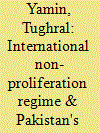

|
|
|
| 2 |
ID:
140925
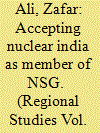

|
|
|
| 3 |
ID:
137245


|
|
|
|
|
| Summary/Abstract |
This article questions the predominantly pessimistic assessments over the future of the Treaty on the Non-Proliferation of Nuclear Weapons (NPT). After analysing available evidence on states’ interests and interactions within the NPT’s framework, it argues that several negative expectations are unwarranted. Conversely, the article identifies three potentially threatening scenarios. Therefore, it scrutinizes the likely impact of reactive nuclear proliferation; analyses the probability of significant actors challenging the existent nuclear architecture; and explores whether the treaty’s enforcement might soon be diluted. The article concludes the NPT is unlikely to face fundamental threats in the foreseeable future.
|
|
|
|
|
|
|
|
|
|
|
|
|
|
|
|
| 4 |
ID:
087914
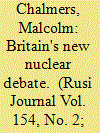

|
|
|
|
|
| Publication |
2009.
|
| Summary/Abstract |
While the recent Prague speech by Barack Obama put nuclear disarmament firmly back on the global agenda, the UK has also been pushing for a 'world free of nuclear weapons'. This distinctive British view developed over the last two years is in part due to the particular way in which the renewal of its deterrent capability was agreed. It also reflected a wider international current of thought. Now, the spectre of arms reductions raises a number of questions for British defence policy-makers
|
|
|
|
|
|
|
|
|
|
|
|
|
|
|
|
| 5 |
ID:
120695


|
|
|
|
|
| Publication |
2013.
|
| Summary/Abstract |
China views Iran as an important country sharing many interests and views with China, and with whom China may benefit via cooperation in a wide number of areas. China views Iran as an especially reliable oil supplier in the event of a crisis in Sino-American relations, and as a capable and ambitious country defending itself against American aggressiveness. Yet Beijing also views maintaining comity in relations with the United States as vital to the success of China's long-term development drive. Beijing eschews open challenge to the US over Iran as potentially undermining Sino-US comity precisely because the US drive against Iran is so strategically important to what China views as a US drive to secure control of Persian Gulf oil. Beijing also views cooperation with Washington in the area of nuclear non-proliferation, and thus the Iran nuclear issue, as a factor stabilising Sino-US relations. China's ties with Iran thus vacillate between cooperation with Iran that often flies in the face of US efforts to sanction Iran, and cooperation with Washington to pressure Tehran over its nuclear programmes.
|
|
|
|
|
|
|
|
|
|
|
|
|
|
|
|
| 6 |
ID:
138010
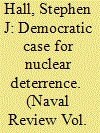

|
|
|
| 7 |
ID:
141116
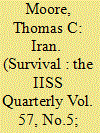

|
|
|
|
|
| Summary/Abstract |
The world’s major powers once agreed that Iran was no place for uranium enrichment or the reprocessing of spent nuclear fuel. United after 9/11 and the jarring revelation of the A.Q. Khan proliferation network, they worked to defeat nuclear proliferation and terrorism – and the nexus of the two in Iran – without military force. They launched criteria-of-supply negotiations in the Nuclear Suppliers Group (NSG); a moratorium on transfers of enrichment and reprocessing technology to new countries in what was then the G8; passage of UN Security Council Resolution 1887, and others demanding Iran suspend its nuclear programme; a coalition for proliferation interdiction called the Proliferation Security Initiative; assurances of nuclear-fuel supply, fuel banks and spent-fuel return, in Russia and with the International Atomic Energy Agency (IAEA); and new treaties, as well as amendments to existing ones, designed to interdict and defeat nuclear trafficking.
|
|
|
|
|
|
|
|
|
|
|
|
|
|
|
|
| 8 |
ID:
111885
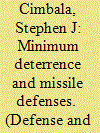

|
|
|
|
|
| Publication |
2012.
|
| Summary/Abstract |
Minimum deterrence is a compromise, or halfway house, between nuclear abolition or nearly zero and assured destruction, the dominant paradigm for strategic nuclear arms control during and after the cold war. Minimum deterrence as applied to the current relationship between the United States and Russia would require downsizing the numbers of operationally deployed long-range nuclear weapons to 1000, or fewer, on each side. More drastic bilateral Russian-American reductions would require the cooperation of other nuclear weapons states in making proportional reductions in their own arsenals. In addition, US plans for European-based and global missile defenses cause considerable angst in Russia and threaten to derail the Obama "reset" in Russian-American relations, despite the uncertainties about current and plausible future performances of missile defense technologies.
|
|
|
|
|
|
|
|
|
|
|
|
|
|
|
|
| 9 |
ID:
109876
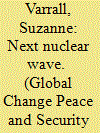

|
|
|
|
|
| Publication |
2012.
|
| Summary/Abstract |
This article examines the extent of the so-called 'civil nuclear renaissance' and the danger it poses to the integrity of the international non-proliferation regime. It also explores the drivers behind the resurgent interest in nuclear energy, as well as the arguments against increased reliance on nuclear power. The article argues that growing interest in the peaceful uses of nuclear energy - even when tempered by strong safety, environmental, economic and security concerns - poses a real challenge to global non-proliferation objectives, a challenge exacerbated by the contradiction at the heart of the non-proliferation treaty architecture. However, the article does not accept the view that civil nuclear capability will inexorably lead to proliferation. Rather, it finds that motive is as central as capability in determining the likelihood of proliferation, and highlights the difficulties of safeguarding against future intentions. Following a brief discussion of the Southeast Asian and North Asian contexts, the paper concludes with a short discussion of how proliferation risks stemming from an increase in nuclear energy might be mitigated.
|
|
|
|
|
|
|
|
|
|
|
|
|
|
|
|
| 10 |
ID:
093227
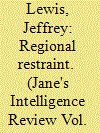

|
|
|
| 11 |
ID:
110472
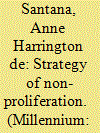

|
|
|
|
|
| Publication |
2011.
|
| Summary/Abstract |
This article criticises the leadership of the new nuclear disarmament movement in the United States for not going far enough. Whether the US administration actually wants to achieve disarmament or not, implementing the current US nuclear policy agenda will not produce a world free of nuclear weapons. Rather, it will reinvigorate an ailing non-proliferation regime by adapting it to confront new nuclear threats. This conclusion is based on a two-part argument. Firstly, nonproliferation is a strategy much like the Cold War-era strategy of extended deterrence. Just as extended deterrence required the US to maintain the credibility of an incredible threat to attack, non-proliferation requires the US to maintain the credibility of an incredible pledge to disarm. Thus, re-establishing disarmament as a credible long-term goal of US nuclear policy will persuade other states in the short term to forgo nuclear weapons and cooperate in restricting access to fissile materials. Secondly, contrary to the common-sense interpretation of the relationship between non-proliferation and disarmament, it does not follow that a robust non-proliferation regime will lead to the elimination of nuclear weapons. In fact, experience suggests just the opposite: Non-proliferation does not lead to disarmament. In conclusion, whatever the Obama administration's aim, the current US nuclear policy will reduce the threat nuclear weapons pose to the US, while obviating the need for the US to disarm itself.
|
|
|
|
|
|
|
|
|
|
|
|
|
|
|
|
| 12 |
ID:
088000
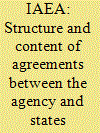

|
|
|
|
|
| Publication |
Austria, IAEA, 1971.
|
| Description |
29p.
|
| Series |
INFCIRC/ 153
|
|
|
|
|
|
|
|
|
|
|
|
Copies: C:1/I:0,R:0,Q:0
Circulation
| Accession# | Call# | Current Location | Status | Policy | Location |
| 006791 | 341.734026/IAE 006791 | Main | On Shelf | General | |
|
|
|
|
| 13 |
ID:
117428
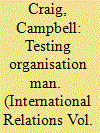

|
|
|
|
|
| Publication |
2012.
|
| Summary/Abstract |
Scott Sagan's analysis of the Cuban missile crisis in The Limits of Safety shows how accidents almost triggered a nuclear exchange during that conflict and how they are likely to cause an actual nuclear war at some point in the future. This article examines how Sagan's crucially important study affects our understanding of the salience of deterrence and non-proliferation in the post-Cold War order and the prospects of nuclear peace. The conclusion contends that Sagan's advocacy of nuclear arsenal modernisation and active non-proliferation efforts aimed at aspiring nuclear powers may well increase, rather than diminish, the chances of major nuclear war.
|
|
|
|
|
|
|
|
|
|
|
|
|
|
|
|
| 14 |
ID:
108669
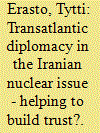

|
|
|
|
|
| Publication |
2011.
|
| Summary/Abstract |
Three European Union (EU) member states - the UK, France and Germany - have played a central role in the Iranian nuclear issue since 2003. However, their contribution cannot be understood without consideration of America's hard-line approach regarding its recent non-proliferation policies in the Middle East and its past policies toward the Islamic Republic. I argue that these policies have highlighted Iran's military and energy insecurity, and that they cast doubt on the limited nature of the demands made to Iran by the Security Council. The fact that European positions have in recent years moved closer to the US also with respect to the key issues that contribute to Iran's lack of trust can actually be seen to undermine the goals of non-proliferation diplomacy.
|
|
|
|
|
|
|
|
|
|
|
|
|
|
|
|
| 15 |
ID:
003096
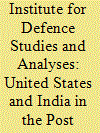

|
|
|
|
|
| Publication |
Washington DC, National Defence University, 1993.
|
| Description |
198p.
|
|
|
|
|
|
|
|
|
|
|
|
Copies: C:2/I:0,R:0,Q:0
Circulation
| Accession# | Call# | Current Location | Status | Policy | Location |
| 034741 | 327.73054/UNI 034741 | Main | On Shelf | General | |
| 034953 | 327.73054/UNI 034953 | Main | On Shelf | General | |
|
|
|
|
| 16 |
ID:
086089
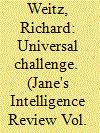

|
|
|
| 17 |
ID:
185997
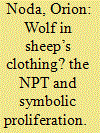

|
|
|
|
|
| Summary/Abstract |
I argue that the Treaty on the Non-Proliferation of Nuclear Weapons (NPT) not only fails to address non-quantitative forms of nuclear proliferation, but also acts as a proliferator of the symbolic values of nuclear weapons. Drawing from Semiotics scholarship, I identify two symbolic roles played by the NPT: as a symbol in itself and as a symbolic proliferator. To support my argument, I employ document and critical discourse analyses, examining the text of the treaty as well as statements from selected nuclear weapon states (NWS) and non-nuclear-weapon states (NNWS) at the 2015 NPT Review Conference (RevCon). This article is structured in two sections: Firstly, I put forward an analytical framework focused on symbolism, exploring the symbolic role of nuclear weapons. Secondly, I turn my attention to the NPT, examining its role and success in the past 50 years employing the symbolic analytical framework.
|
|
|
|
|
|
|
|
|
|
|
|
|
|
|
|